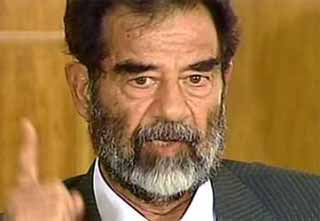
Saddam Hussein is gone! Speculation is on whether this will translate into a worsening of violence in Iraq. Probably yes. At least temporarily so.
Iraq was literally squeezed in Hussein's fist for 35 years. As a child I experienced the Stalinist era in Eastern Europe. Parents were scared to speak openly in front of their children lest those utter questionable remarks somewhere in public inadvertently, which then would bring tragedy onto the heads of the parents. As a result those children (myself included) grew up completely under the influence of the political slogans of the time. When Stalin died, we children shed genuine tears, not knowing any better. Of course Russian politics quickly took care of Stalin's memory, opening up our eyes in the process, making us less susceptible for further hero worship.
In Iraq this process did not have a chance to occur "naturally". Saddam was toppled by foreign forces, forces which were painted in very unfavourable colours previously, forces that gained an even more negative image as time passed. Iraq has a very large segment of the population that isn't very well educated, at least not from the point of view of world politics. or maybe I should say: they have been very well educated by the Saddamist propaganda machine. They grew up on in an artifical political environment, in a virtual glass bowl. They tend to gravitate towards any center of power, at the same time fearing it while looking for its safety, entering voluntarily under its umbrella. It will probably take a whole generation to shed the effects of the Stalinist style Saddam era.
This new generation will have the task of sifting through all the data of the past, straightening out the facts, finding the truth and laying down the grounds for an open society. Can the Iraquis do it quickly? I hope so. Things are definitely changing at a rapid pace in the Middle East. Every day there are surprising little news items, things developing in directions that one would not have thought possible just days earlier. Mahmoud Abbas calling new elections, Syria expressing willingness to make peace with Israel. Even Libya seems to be changing, prompting the US to improve its relations with the Qadhafi regime.
A lot of credit must be given to the Al Jazeera network for impacting the flow of information in the Arab world. I have been watching them occasionally, and my impression is that they are trying very hard to be fair and impartial. Do they always succed? Of course not. But show me one media outlet that could claim to be truly successful from this point of view. It is an impossible task, even for such veterans as the BBC or CNN. News reporting is a very hectic business. News items are pouring in incessantly, and reports are always representative of the reporters personal views. Decisions must be made then by the news editors about the validity of these reports on the spot, again filtering these through their own prejudices. And then here WE are, sifting through all the information and trying to form our opinions.
The most important thing is that we have all these differing views available to us. Al Jazeera's English program, although not carried by any American network as yet, is available on the internet. It is interesting to note that one of the countries where Al Jazeera is carried by local cable is Israel, while dropping BBC World, which has been accused of anti-Israel/anti-American bias in the past. Could Al Jazeera be less biased than the BBC? The Israeli action seems to indicate that they think so there.
No comments:
Post a Comment